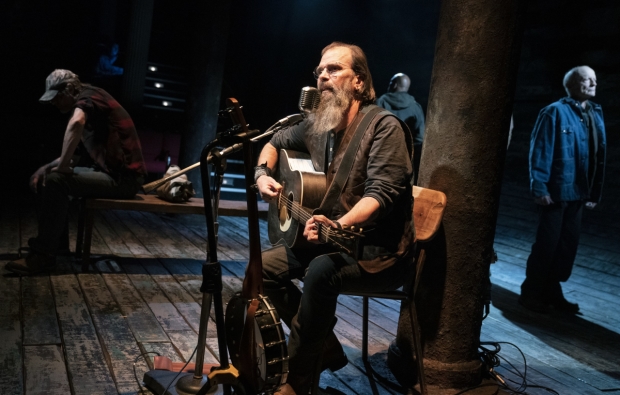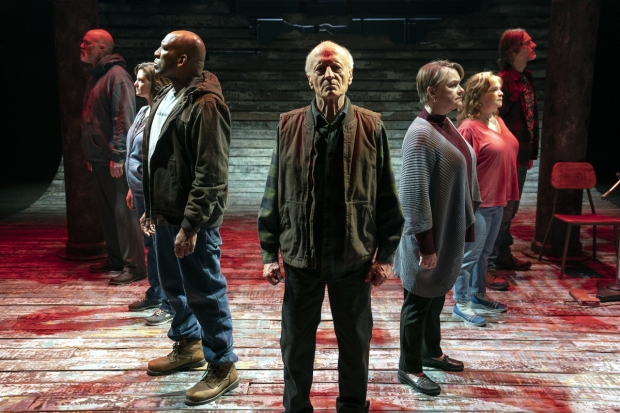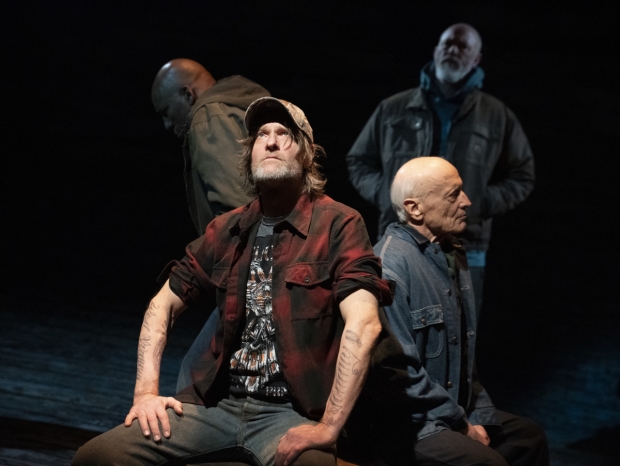Coal Country Takes Us to West Virginia Where We're Far Past Canaries

(© Joan Marcus)
New York theatergoers are enthralled by the origin stories of Trump voters. Lynn Nottage's 2017 Pulitzer Prize winner Sweat charted the hate that grew out of economic hardship among factory workers in Reading, Pennsylvania. In 2019, Suzan-Lori Parks mapped the birth of white male rage in her three-hour epic White Noise. And just this season, Will Arbery's Heroes of the Fourth Turning shocked audiences with the revelation that young conservatives from Wyoming can have both fervor and intelligence.
Perhaps such plays satisfy the liberal craving for that ever-elusive "why" in these confounding times of political division. But Coal Country, Jessica Blank and Erik Jensen's latest documentary piece at the Public Theater (joining their previous works The Exonerated and Aftermath), is a refreshing reminder that it is still possible to tell a "red state" story without making it an anthropological study or a fact-finding mission behind enemy lines.
The only enemy in Coal Country is Massey Energy CEO Don Blankenship, who was in charge when 29 coal miners died in a massive explosion at the Upper Big Branch mine in Montcoal, West Virginia in 2010. We never meet this looming figure. We only hear details of his negligent practices from victims' family members and the catastrophe's two lone survivors, who took him to court and won a moderate victory that was really just another defeat at the hands of greedy corporate America (Blankenship was indicted and convicted for conspiracy to violate mine safety standards, but not held responsible for any of the casualties). That larger story — which you may only vaguely recall from a few news cycles — emerges from the web of smaller personal stories that Blank (who also directs) and Jensen highlight in the context of courtroom testimony (Melinda Tanner appears briefly as Judge Irene Berger).

(© Joan Marcus)
In terms of performances, Coal Country is a bounty of riches, with an ensemble that does thoughtful service to each of their real-life characters. There's Goose and Mindi (Michael Gaston and Amelia Campbell), a miner and his wife who still crow about their first date at a bowling alley; Gary (Thomas Kopache), a miner of 34 years with union blood whose son now works the family trade; Tommy (Michael Laurence), a man who followed his brother, son, and nephew into the mines; Roosevelt (Ezra Knight), who worked dispatch for UBB while his father did the dirty work underground; Patti (Mary Bacon), who was poised to build a new family with her neighbor-turned-fiancé Greg and his son; and finally Judy (Deirdre Madigan), a doctor and de facto outsider among the victims' working-class families, despite the fact that her brother Dean was among the casualties (costume designer Jessica Jahn does smart work with Judy's clean-cut ensemble, speaking volumes about class tensions in West Virginia with a subtle visual outlier).
Surfacing in all of these threads are similar stories of legacy, tradition, and necessity in a community that offers little in the way of work for its residents beyond coal mining. Coal is more a way of life than a trade, which naturally creates an insular culture of tribalism, but also a culture that is more delicate and nuanced than is often appreciated.
Steve Earle, as our musical emcee, plunges us into an authentic version of that microcosm with the sounds of West Virginia. Within set designer Richard Hoover's stage of wood and rusty steel (accented beautifully by David Lander's lighting design), Earle pays tribute to the earthy, soulful music of Appalachia with a collection of new songs — an ideal antidote to hateful hillbilly clichés that still linger in popular culture. Earle even goes so far as to enforce an audience sing-along. And let me tell you, a roomful of New York Democrats warbling about "union, God, and country" is a sight to behold.
"Union, God, and country was all we ever knew" is the song's refrain. And what becomes most apparent by the end of our trip to Coal Country is just how intimately this group of West Virginians do indeed know that trinity. As coal veteran Gary, Kopache (with the same drawl he famously uses to comedic effect as John Oliver's "catheter cowboy," if you were wondering why he looks so familiar) personifies the knowledge that comes from 34 years of experience. He talks us through the details of Massey's acquisition of UBB, the mine's transition from union to nonunion labor, and the dirty details about the dangerous treasure trove of cash that comes from longwall mining — all details Blankenship's lawyers would prefer to leave hazy for the less savvy family members of the deceased.
And returning to the subject of Blankenship for a moment, I think it's important to note that the disgraced CEO, at this very moment, is running for president as a member of the Constitution Party. So while Coal Country mercifully stays out of the election fray and sticks with simple, powerful storytelling — if the right and the left were looking for something to unite against, this could be a golden opportunity.

(© Joan Marcus)










